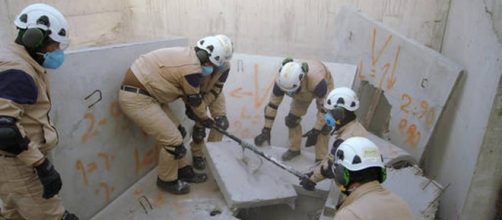Khaled Khatib worked as a cinematographer on the harrowing film “The White Helmets,” documenting the Syrian civil war. According to internal correspondence by the Trump administration, the Department of Homeland Security decided at the last moment to stop the 21-year-old from traveling from Syria to Los Angeles for the Oscars ceremony.
Khatib was set to arrive in Los Angeles on Saturday, flying in on a Turkish Airlines plane from Istanbul. However, after U.S. officials reported found “derogatory information” regarding the cinematographer, they decided to block his entry.
According to AP News, the term “derogatory information” is a broad category which can include anything from passport irregularities to a connection to terrorism. Reportedly when a spokeswoman for the Department of Homeland Security was asked for comment, Gillian Christensen told AP merely that a valid travel document is required when traveling to the U.S.
'The White Helmets' nominated for an Oscar
Released by Netflix, “The White Helmets” is a 40-minute documentary, which has received the nomination for Best Documentary Short. Should the documentary win an Oscar, this will be handed to the film’s director, Orlando von Einsiedel along with producer Joanna Natasegara. However, the Syrian national was one of three people credited for the documentary’s cinematography.
The White Helmets are well known as being rescue workers who regularly risk their lives to save Syrian nationals affected by the civil war. Reportedly many of those workers have been killed by the air forces of Syrian President Bashar Assad.
Inspired to record the work of the White Helmets
Khatib headed to Twitter Saturday afternoon to note his passport had not been accepted by U.S. authorities and that he had spent the last three days at the airport. He said it was sad, but there was still important work to do in Syria.
After 3days at airport, not allowed to travel to #oscars2017 - had US visa - but passport not accepted. Sad, but important work to do here.
— Khaled Khatib (@995Khaled) February 25, 2017
The Washington Post quotes Khatib as saying he was a teenager when the war broke out in Syria.
After seeing foreign TV crews and journalists travelling to his hometown of Aleppo to document the civil war, he was inspired to record his own footage of the White Helmets in action. He wanted to tell the story of his city and his people. Khatib said the work was traumatic and grueling, including his first mission, which was a massacre in which more than 100 people died. He went on to say this was the worst day for him, due to all the casualties and bodies of the victims. He said he kept on seeing the bodies in his dreams. However, he realized it was important for people outside of Syria to see the work of the White Helmets, saying how easy it is for anyone to kill someone, but how much harder it is to save lives.
Reportedly it was in November 2015 that Einsiedel and Natasegara reached out to Khatib to collaborate with them in making a documentary. The young Syrian instantly agreed and spent some months learning more about his craft from fellow cinematographer Frank Dow.

